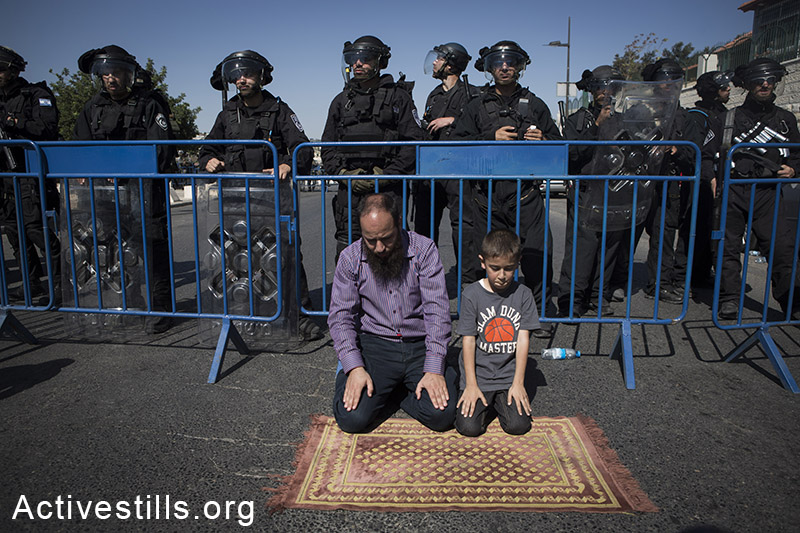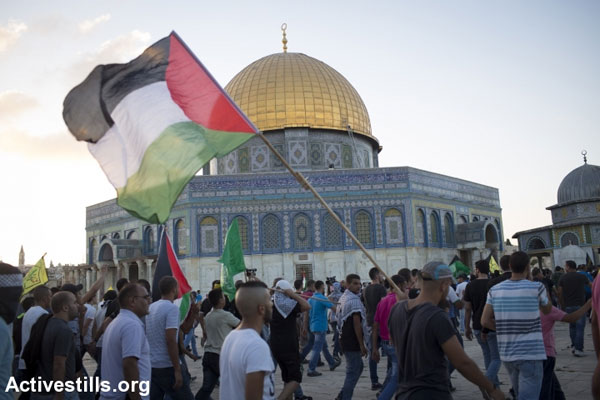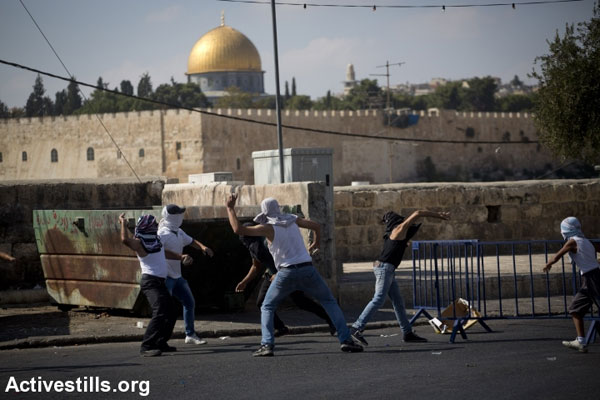The attempt to assassinate a prominent right-wing Jewish activist in Jerusalem has brought the city to a boiling point. Now is the time for responsible leadership.
Palestinian Authority President Mahmoud Abbas called the Israel Police’s decision to temporarily close the Haram al-Sharif/Temple Mount to all visitors — Jewish and Muslim — “a declaration of war” on the Palestinian people and the Islamic nation, speaking in the aftermath of an attempted political murder in the already tumultuous city.
Yes, the increasing and more frequent restrictions on Muslim worshipers’ access to the Aqsa Mosque is a valid and serious grievance. Those restrictions, coupled with more frequent and more bold visits to the site by Jewish extremists have been responsible for fueling much of the anger radiating from East Jerusalem in recent months.

Nevertheless, describing Thursday’s closure — which was made purely to prevent clashes from escalating at a dangerous junction — as a declaration of war on all Palestinians and Muslims, is to provoke, not calm. Abbas should not be blamed for his frustration with Israel in almost every aspect of the relationship, but this is a time that calls for responsible leadership.
Abrogating responsibility, ignoring causation
Likewise, the Israeli leadership’s attempts to abrogate responsibility for the sources of anger and violence in Jerusalem, along with its campaign blaming it all on incitement by the Palestinians, makes one question how much they want to prevent another violent explosion.
To his credit, Israeli Prime Minister Benjamin Netanyahu said that “we” must “lower the flames. “No side should take the law into its own hands.” In the same breath, however, he blamed the current situation on the incitement of “radical Islamic elements and by Palestinian Authority Chairman Abu Mazen who said that Jews must be prevented from going up to the Temple Mount by any means possible.”

Netanyahu made no mention of a draft law that would change the delicate status quo on the Temple Mount/Haram al-Sharif. The draft law, which would likely enjoy little support in the Knesset, has been used as a rallying cry for Palestinians and Muslims in the region who see it as yet another step toward the ultimate fear: that Israel, or Jewish Israeli extremists, plans to take over the compound in order to demolish the Aqsa Mosque and build a Third Temple.
Read more: Disturbing the ‘peace’ in Jerusalem’s holiest site
Such fears were not assuaged in recent months as one of a number of extremist Jewish groups raised $100,000 to draft architectural plans for such an endeavor. It would be wise to remember the Jewish Underground plot to blow up the mosque 30 years ago — the Palestinians remember it — for which the plotters were pardoned by then-Israeli President Chaim Herzog in 1990.
Although the Israeli prime minister has indeed made a number of reassurances that Israel “is committed to maintaining the status quo exactly as it’s been for many decades,” he has not come out and rebuked those elements on the Israeli side who are — very vocally — advocating for exactly the opposite. He has not addressed the Palestinian population of East Jerusalem, the West Bank or the Arab world with conciliatory and calming assurances that such forces are marginal or are being marginalized.

Instead, he places the blame entirely on the Palestinians. Once again, he has an opportunity to act as a responsible and conciliatory leader in a dangerous moment. Instead, he dismisses all criticism and passes the buck by treating Palestinian grievances as invalid at best or nonexistent at worst, and blaming the current situation entirely on the Palestinians.
The extremists
And then there are the extremists. Yehuda Glick is one of them. He and others of his ideological stream want to see the Aqsa Mosque demolished to make way for a third Jewish temple. They have moved from the radical fringes closer to the mainstream in recent years and enjoy support and representation from inside the government.
Glick ally and radical Knesset member from Prime Minister Likud’s ruling party Thursday morning attempted to defy the police closure of the Temple Mount and said, “Temple Mount should be opened today exclusively to Jews.”
As Betty Herschman wrote in +972 earlier this year:
In the past year alone, hundreds of national religious Jewish pilgrims have ascended the Mount, including groups of rabbis, women, members of Knesset and uniformed soldiers. While the various Temple organizations may have differing goals and varying impacts, a common denominator of religious and nationalist messianism distinguishes the movement as a whole. Religion has becomes a tool for realizing extreme national goals at a site that is a focal point of political and religious tension.
And of course, the events on the Temple Mount do not take place in a vacuum. In the sometimes deceivingly simple Israeli-Palestinian conflict, a number of micro-conflicts are in no way disconnected from other conflicts and the larger question on Palestinian and Israeli self-determination. Yonathan Mizrachi wrote in these pages yesterday, before Glick’s shooting:
Some argue that the tension in East Jerusalem is tied to the question of sovereignty over the Temple Mount: that is, tension on the Mount leads to unrest in the streets, not vice versa.
…
When one takes into account the status of the Temple Mount in Judaism, the military and political power of Israel in the region, and the unwillingness of many Israelis recognize the importance of the site in Islam in general and to the Palestinians in particular, it becomes evident that Israel’s tightening grip on the Temple Mount is a result of the wider political reality.
None of that, of course, can justify political assassinations, or attempted ones, like we saw in Jerusalem Wednesday night when another extremist, this time from Palestinian side, tried to kill Mr. Glick.
Read more: Why the Temple Mount status quo isn’t sustainable
We will never know exactly why Muataz Ibrahim Hijazi allegedly tried to murder Yehuda Glick. He was shot dead by Israeli special police forces in a shootout at his home early Thursday morning. It is probably safe to assume that Glick’s stature as a symbol of radical Jewish threats to the Aqsa Mosque had something to do with it, but we will never know.
What is clear — and terrifying — however, is that a single person acting on his own can catapult Israel and Palestine, already in such a dangerous place, into flames that threaten so many.
And then there is the elephant in the room: the occupation, which many people love to forget includes East Jerusalem. When an entire population is neglected by the government and municipality who claim authority over them, when their right to live in their hometown and holy city is permanently under threat, when now-regular construction plans threaten to cut them off from the rest of what may or may not one day become a Palestinian state, when extremist Jewish elements with the support of the state are attempting to wrest control of already contested neighborhoods — then one of the most contested cities on earth is destined to remain a powder keg for the foreseeable future.
Without an end to the occupation, without responsible leaders and without good guys, that is a sad and scary prospect — that is our reality.
Related:
Why the status quo on the Temple Mount isn’t sustainable
PHOTOS: Protests in Jerusalem over Aqsa Mosque closures
IDF makes the Dome of the Rock vanish from photo, and lies about it


